Social Psychology Grażyna Bartkowiak : ……………………………. . @vistula.


Social Psychology Grażyna Bartkowiak : ……………………………[email protected]

Social Psychology Content Module 1.Introduction to social psychology 1.1. Social psychology as a branch of psychology 1.2. Attitudes and their relevance to human behavior

. Social psychology as a branch of psychology Social psychology - a field of science from the border of psychology and sociology that studies how the presence of other people and their actions affect the psyche of the individual. In other words, it is the science that studies mental processes and behavior of people in social situations - those where there are other people. It is a relatively young branch of psychology that distinguished only at the end of the thirties of the twentieth century with the development of experimental methods Kurt Lewin and his students

Social psychology as a branch of psychology Social psychology examines how people influence the way of thinking, emotions, and attitudes of other people, both unconsciously and purposeful action. Field of study of this science are both social processes affecting the human individual and the processes occurring in small groups of people. "... While the social psychologist examines the individual in the group, a sociologist has to do with the group as a whole" - Floyd Henry Allport suggests [1]. Stefan Baley defines it slightly differently: "Social psychology is the psychological analysis of social phenomena" [2].

Social psychology uses a statistical method, comparative method, using ethnographic and experimental method. The origins of social psychology This area was at the beginning of the twentieth century, however, the subject matter has already been taken. One of the first works is the loud crowd psychology Gustave Le Bon [3], are written in the nineteenth century, in which he described, inter alia, the impact of the crowd on the decisions taken by the unit. In it, he formulated the famous thesis that the individual in the crowd behaves differently than outside of it.

Attitudes and their relevance to human behavior Social Psychology in Poland had its beginnings before World War II, but the actual start of the Stanislaw Mika indicates the year 1959, when released Introduction to Social Psychology Stephen Baley'a

Attitudes and their relevance to human behavior Area of Effect He is: • group dynamics, dealing with the structure, objectives and standards group, the processes of communication, the phenomenon of conformism, the problem of leadership in the group and conflicts within and outside the group; • behavior problems, dealing with factors influencing attitudes, behavior change techniques, union attitudes of personality;

Attitudes and their relevance to human behavior • socialization - a process in which a person becomes a social being, a member of the community, familiar with and abiding force in the standards and practices; • issues of interpersonal perception

Attitudes and their relevance to human behavior Social psychology uses methods and techniques such as the survey was a survey study in the field, a natural experiment, experiment and experiment in the laboratory. In social psychology there are four main theoretical approaches: • socio-cultural • evolutionary • social learning • socio-cognitive.

Attitudes and their relevance to human behavior This latter approach is currently the mainstream. From the perspective of socio-cognitive social psychology appears to be empirical (scientific) study of the impact of social and cognitive processes, the way in which people: • perceive and understand each other (social cognition), • have an impact on other (social influence), • come into contact with each other group’s processes, intergroup and interpersonal relationships).

Attitudes and their relevance to human behavior Entering and succumbing to the influence may be either unaware of, such as the imitation of someone, as well as fully intentional, as it happens in situations of social manipulation, for example, used in advertising and political campaigns. Thanks to social influence, social groups are much more than a collection of individuals.

Attitudes and their relevance to human behavior Through his influence group norms arise, public opinions, and single people can go beyond self-interest and direct their activities to implement the good of the community. The social impact is therefore an important force, standing at the base of social phenomena that determine the progress of civilization. Social psychology used skillfully, can have a powerful effect on a community that shapes the future reality.

Attitudes and their relevance to human behavior The concept and classification of social attitudes and factors influencing their formation. The concept and classification of social attitudes and factors influencing their formation The term social attitude is one of the fundamental concepts in social psychology and sociology used in various senses.

Attitudes and their relevance to human behavior In. Kozlowski states that: "The term is usually understood as the attitude of a relatively permanent arrangement beliefs, emotions and feelings, and behavior of the individual in relation to an object (a person, object, idea). The attitude we say when: individual becomes aware of the existence of a certain object, person, or idea; during intercourse with the object formed certain beliefs about it; - contacts with the object lead not only to produce convictions, but also to respond emotionally, which is characterized by a kind of feeling excited by the object (positive, negative) and their strength;

Attitudes and their relevance to human behavior - emotional relationship, emotional prompts the individual to a specific behavior in relation to the object, expressed in a tendency to avoid or aggression, or closer. " According to H. Larkowa term attitude "... is an acquired disposition to respond (behavior) in a specific way to certain stimuli, which are the subjects, people, events. "

Attitudes and their relevance to human behavior T. Tomaszewski states that "... when we talk about someone's attitude towards an issue, then we usually have in mind: first - his knowledge and beliefs about, and secondly - its characteristics and emotional relationship to the case, third - that which is able to do about it " .

Attitudes and their relevance to human behavior The term is synonymous with the concept of an attitude adjustment. According to W. perch attitude is: "... tendency to perceive and evaluate people, things and events in a way conditioned by past experience of the individual. An example of persistent attitudes, among other superstitions, which are formed in childhood often, especially under the influence of negative notions generated by the opinions of parents, siblings or peers.

Attitudes and their relevance to human behavior However, W. Kozlowski says that attitude "... this is the ability to respond in certain situations and not in the other reaction. This term also means preparing for the reception of certain specific stimuli. The ambiguity of this concept is the consequence of its occurrence in psychology in several contexts. In contrast to the attitude, the attitude of the concept focuses on the aspect of readiness to respond, rather than react emotional feelings to the object. Setting, in contrast to the approach include more elements unconscious and habitual poorly. "

Attitudes and their relevance to human behavior Social attitudes are very complex. According to H. Larkowa "They aspect of cognitive, emotional and motivational. Intellectual component consists in comparing the attitudes of individuals with established standards, patterns and making value-assessment. Emotional component is positive or negative, associated with pleasant or unpleasant experiences. Motivational component directs our behavior "to" or "from" object approach”.

Attitudes and their relevance to human behavior As reported in H. Larkowa assumed that "... attitudes may be favorable ("for"), hostile ("against"), or neutral, or indirect - undecided. Alternatively use the terms - a positive attitude ("for") and negative ("against"). "

Attitudes and their relevance to human behavior You may also have ambivalent attitudes, bivalent - positive and negative. According Larkowa "In these cases, usually dominates one component attitude. For individuals with disabilities often negative. Therefore, individuals with abnormalities are usually distinguished by two extreme social attitudes: positive - describing it as acceptance and negative - rejection. "

Attitudes and their relevance to human behavior Social attitudes are influenced by a variety of socio-cultural factors. By T.Mądrzycki are the following factors: the impact of culture, the impact of basic social groups, knowledge, gender, age. Attitudes of individuals have their cultural background. According to T. Mądrzycki "is associated primarily with its membership in a particular nation, class or social stratum. Each of these communities has its own culture.

Attitudes and their relevance to human behavior The culture consists of some kind of statement about reality - scientifically proven or beliefs and myths - and ideologies, societal norms, styles of behavior, personal patterns, etc. All of these elements of culture affect the attitudes of the participants.

Factors influencing attitudes By creating your own attitude based unit to a lesser or greater extent on social values, which are the basic building blocks of the formation of attitudes. The factors influencing attitudes also include the impact of basic social groups. In any social environment there are certain social norms, customs, traditions, beliefs, practices, education, distributed beliefs, which are often prejudice and directly influence the formation of attitudes.

Factors influencing attitudes By T. Mądrzycki direct influence on attitudes to small groups. According to the author's small groups are "... a collection of people joined together social bond, and a bond of contacts and relationships in which they come together." One of the main groups influencing the attitudes of the family. Parents have a significant influence on the attitudes and behavior of the child, as they cater to their needs.

Factors influencing attitudes Parents have the appropriate social experience, knowledge and intellectual maturity. By T. Mądrzycki "a big impact on the child of parents is also clear from the fact that they are the first people interacting on his psyche. They interact with the child during the period when the psyche is very plastic. In early childhood, as indicated by many psychologists, form the base of the personality of an individual. " Family, therefore, provide child social values, moral norms, customs, religious beliefs and various social stereotypes, which shapes his attitude.
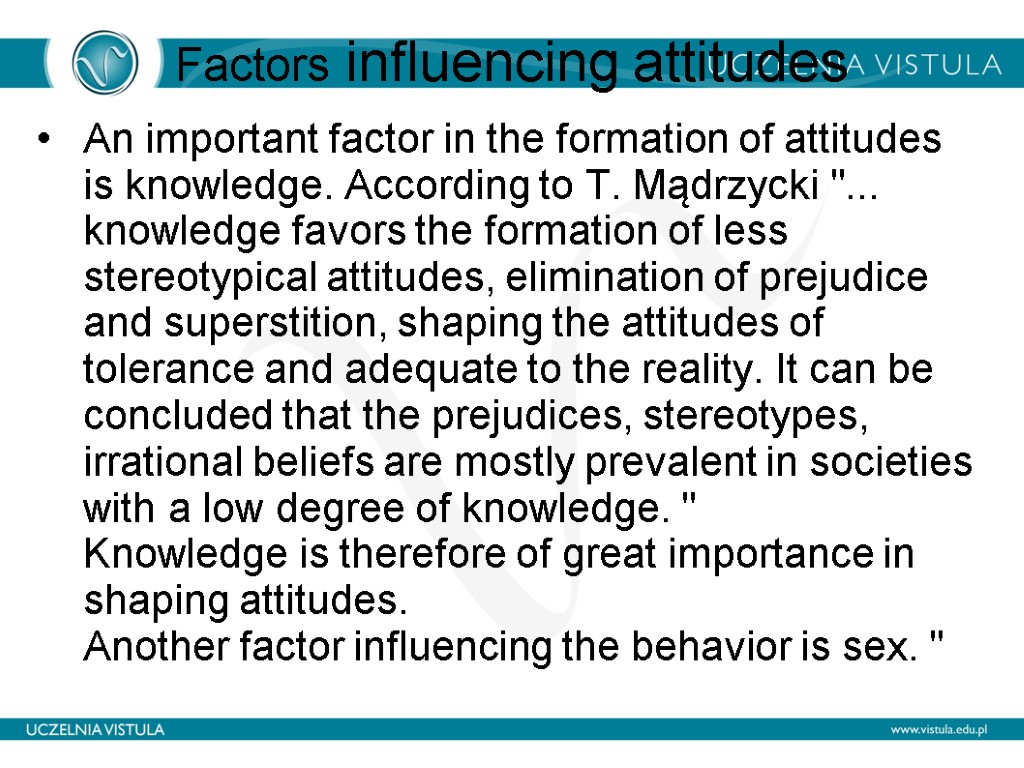
Factors influencing attitudes An important factor in the formation of attitudes is knowledge. According to T. Mądrzycki "... knowledge favors the formation of less stereotypical attitudes, elimination of prejudice and superstition, shaping the attitudes of tolerance and adequate to the reality. It can be concluded that the prejudices, stereotypes, irrational beliefs are mostly prevalent in societies with a low degree of knowledge. " Knowledge is therefore of great importance in shaping attitudes. Another factor influencing the behavior is sex. "
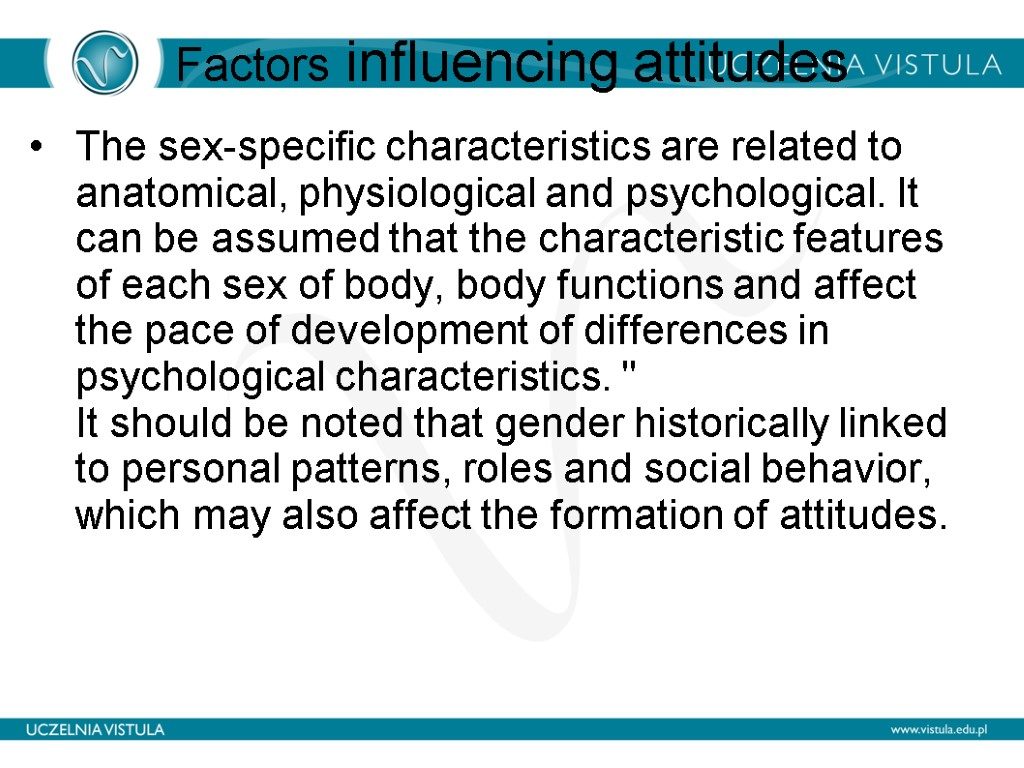
Factors influencing attitudes The sex-specific characteristics are related to anatomical, physiological and psychological. It can be assumed that the characteristic features of each sex of body, body functions and affect the pace of development of differences in psychological characteristics. " It should be noted that gender historically linked to personal patterns, roles and social behavior, which may also affect the formation of attitudes.
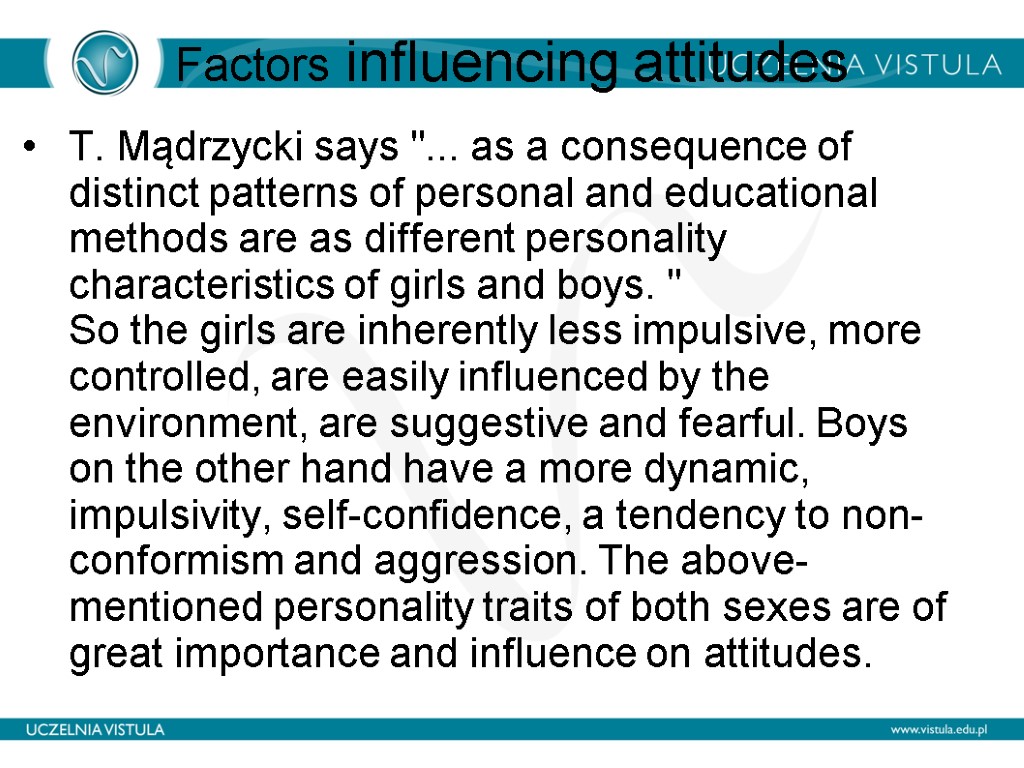
Factors influencing attitudes T. Mądrzycki says "... as a consequence of distinct patterns of personal and educational methods are as different personality characteristics of girls and boys. " So the girls are inherently less impulsive, more controlled, are easily influenced by the environment, are suggestive and fearful. Boys on the other hand have a more dynamic, impulsivity, self-confidence, a tendency to non-conformism and aggression. The above-mentioned personality traits of both sexes are of great importance and influence on attitudes.
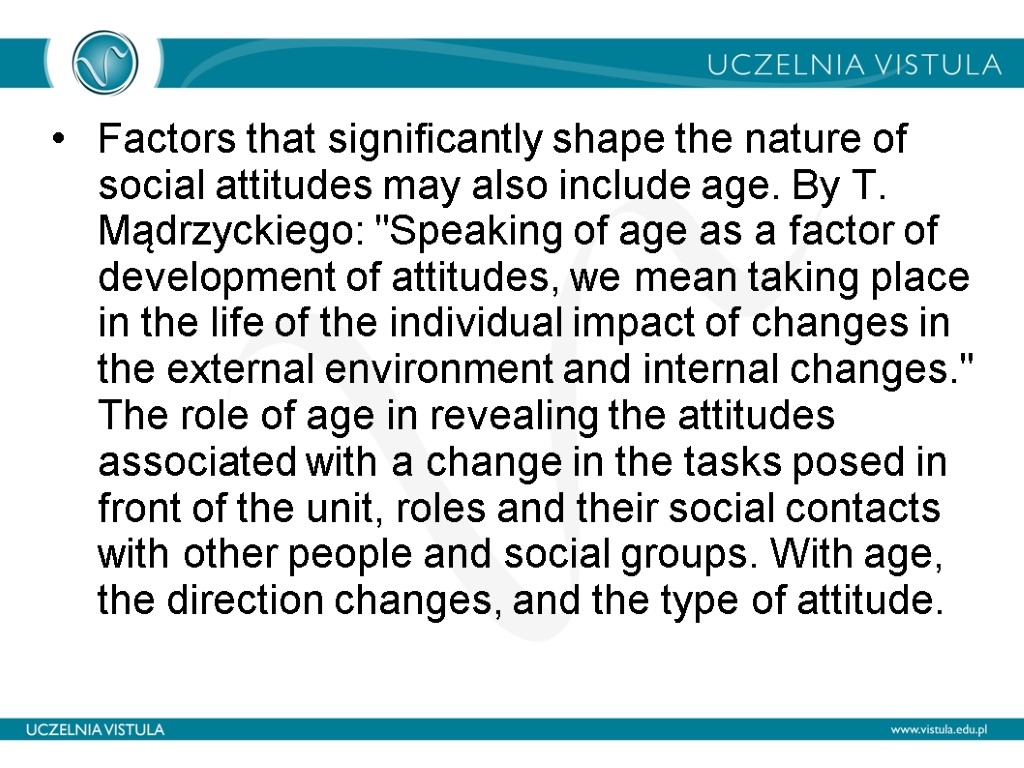
Factors that significantly shape the nature of social attitudes may also include age. By T. Mądrzyckiego: "Speaking of age as a factor of development of attitudes, we mean taking place in the life of the individual impact of changes in the external environment and internal changes." The role of age in revealing the attitudes associated with a change in the tasks posed in front of the unit, roles and their social contacts with other people and social groups. With age, the direction changes, and the type of attitude.
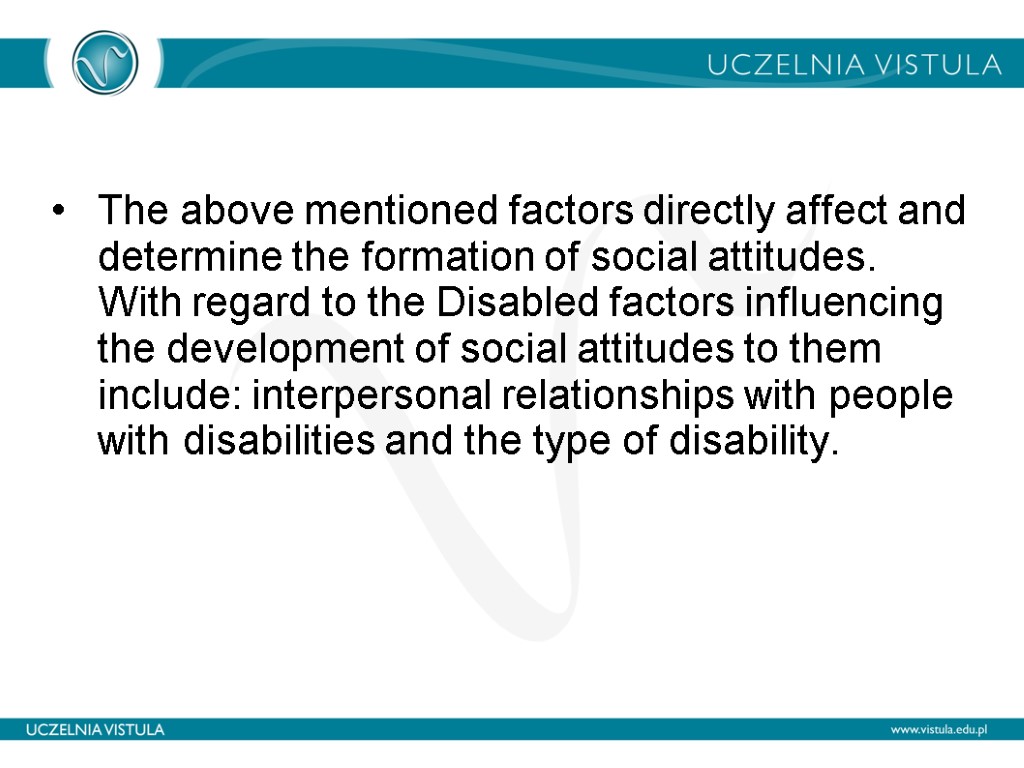
The above mentioned factors directly affect and determine the formation of social attitudes. With regard to the Disabled factors influencing the development of social attitudes to them include: interpersonal relationships with people with disabilities and the type of disability.
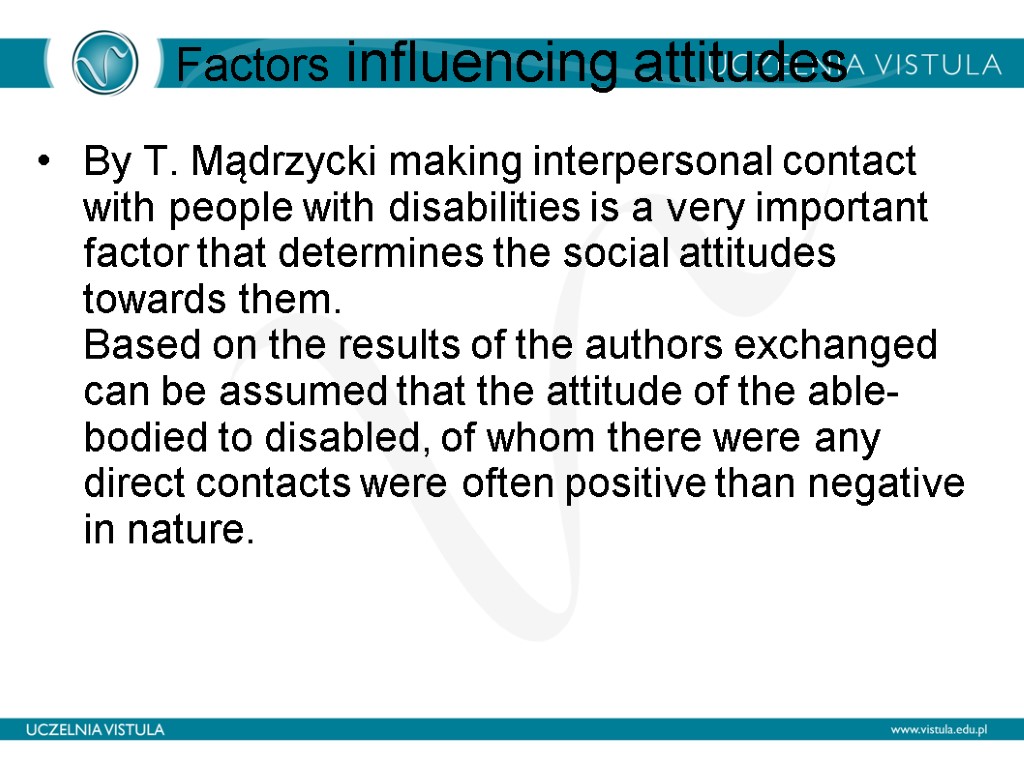
Factors influencing attitudes By T. Mądrzycki making interpersonal contact with people with disabilities is a very important factor that determines the social attitudes towards them. Based on the results of the authors exchanged can be assumed that the attitude of the able-bodied to disabled, of whom there were any direct contacts were often positive than negative in nature.

Thank you for your attention!
social_psychology.ppt
- Количество слайдов: 33

